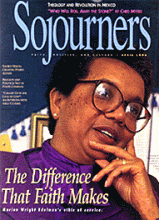As I was driving home from work recently, I heard a new song on the radio. Encouraged by the driving beat and engaging tune, I turned up the volume, only to be sorely disappointed. At least every fourth word, or so it seemed, was deleted or bleeped. As near as I could make out, it was typical "gangsta" fare: guns, bitches, 187s, and their interplay in the life of the rapper.
Changing stations, I questioned why a radio station would play a song so riddled with expletives that the need to censor it rendered the end result a disjointed cacophony of bleeps. It seemed that a good program director could simply dig deep and find the intestinal fortitude to refrain from allowing the song air play.
A mid-twentysomething black woman, I’ve been an unabashed fan of rap music since its infancy. I’ve listened to it evolve, winding its way into our collective consciousness from the fringes of a young black subculture to its present status as an entrenched feature of American popular culture.
I’ve watched rap grow as an expression form. With a creativity reminiscent of the best pioneering blues and jazz artists, the best rap musicians have pronounced, proclaimed, provoked, and entertained my generation for more than a decade.
As recent media focus shifted to gangsta rap and its impact on the culture, I recalled being in college and listening to the underground debut album of a young group based outside of Los Angeles. I was compelled by the uncompromising lyrics and hard core baseline; I listened as much for the sociology as for its value as a dance track.
Read the Full Article
